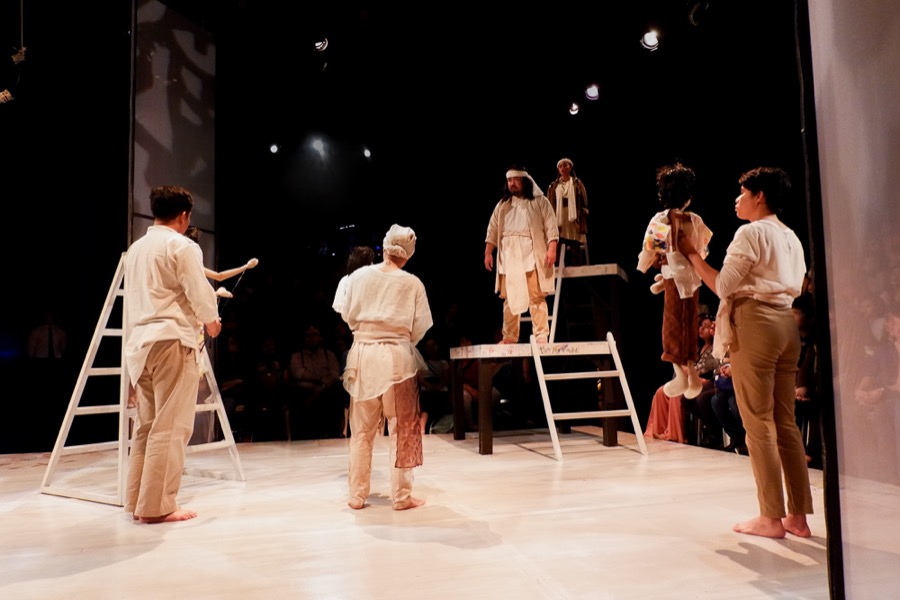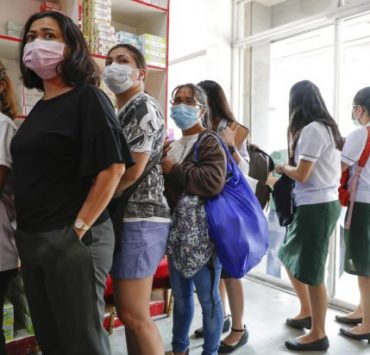Tanghalang Pilipino closes their “Makidigma” season with a strong piece that puts the focus on conflict, violence, and its effects on society, especially children. “Batang Mujahideen,” written by Malou Jacob and staged by Guelan Varela Luarca and the Tanghalang Pilipino Actors Company, mixes performance with documentary material to show the stories of Christian, Muslim, and Yakan groups in Basilan, Mindanao.
It tells the story of Fatima, a child caught in the middle of the Mindanao conflict in the early 2000s, who later on becomes a “batang mujahideen,” or a child trained to partake in the practice of jihad. It also tells the story of the teachers, priest, and students of Claret School in Basilan, who were held hostage by the Abu Sayyaf.
Nolisoli editor Pauline Miranda and content creator Zofiya Acosta caught one of the shows and shared their thoughts on the play.
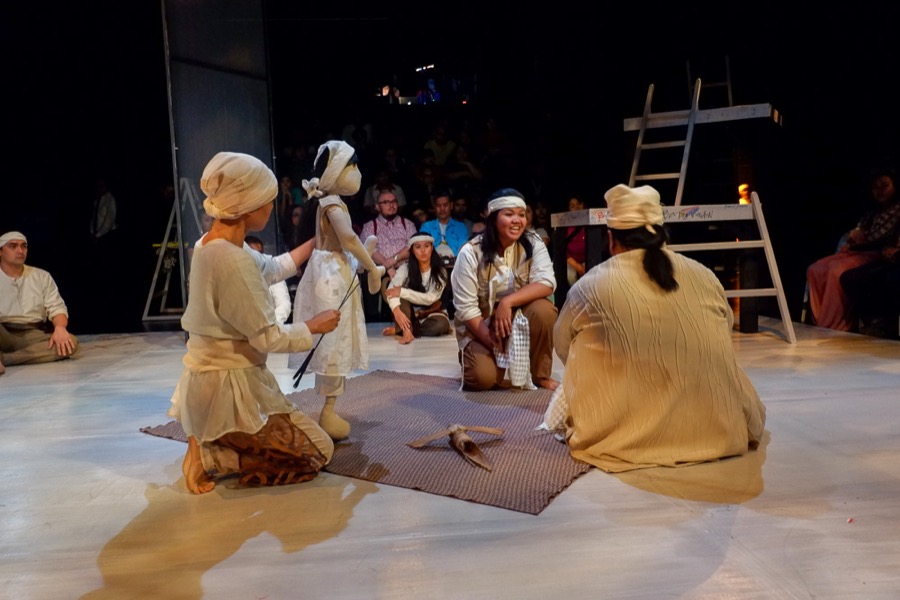
The use of puppetry
Zofiya: Not going to lie, I’m a ’00s era theater nerd above anything else, so my first thought when I walked into the theater and saw the puppets hanging from the ceiling was, “Oh! Avenue Q!” Thinking about it now, though, I still think it’s a fair comparison: Batang Mujahideen also uses puppets in an almost perverse way, this time by highlighting the violence that the children are exposed to. At the talk back after the show, Tanghalang Pilipino director Nanding Josef revealed that the script originally called for actual child actors—I’m glad they made the decision to switch to puppets. I don’t think the play would’ve been as powerful with child actors. There was something unsettling about seeing the puppets flank the stage, their blank innocence a stark contrast against the grim world the adults inhabited. It also hit on a visceral level when the other puppets aside from Fatima, which prior to that scene just acted as scenery dressing, descended to play as child soldiers.
Pauline: I was pretty surprised about the puppets, actually. When they did a very short (around 10 minutes) preview during the press con, they had a puppet but mentioned something along the lines of, it wasn’t final yet. So when I got to the theater and saw the puppets, my first thought was, “oh, they went through with it.” And yes, I agree, it was a good decision they opted for puppets instead of child actors. I think this made the message more impactful, because now the puppets weren’t just physical representations of the children-turned-soldiers, they also represented the idea of children becoming “puppets” for the adults and their agendas.
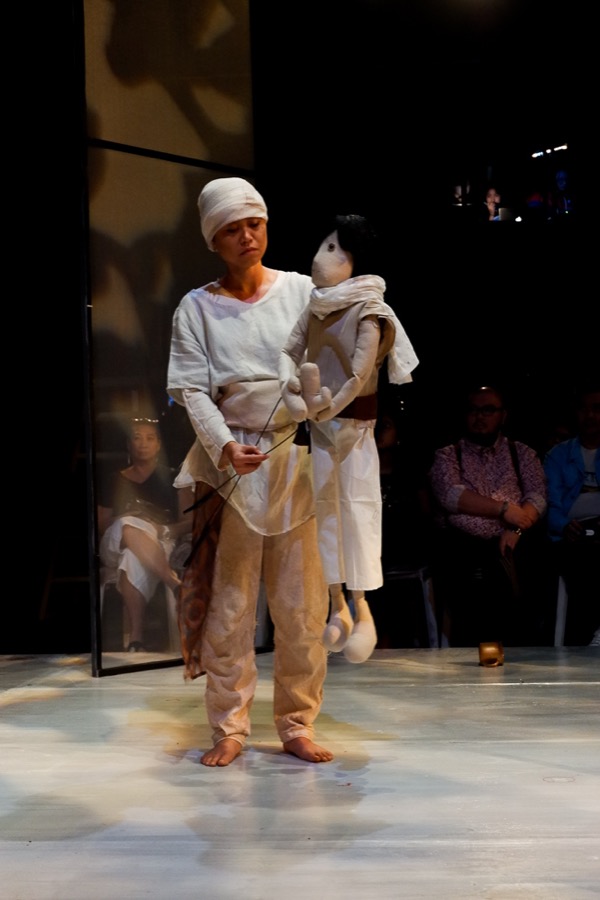
P: And yes, the blank faces! I thought that was a good touch, to keep it expressionless. I think it shows how malleable children are. In the early scenes Fatima’s innocent, but as she becomes a “batang mujiahideen,” the blankness of expression perhaps could now be taken to mean… becoming emotionless as a “puppet” soldier, too.
On the collaboration between creative team and cast
P: I also find it interesting how they keep saying the show is “staged by Guelan Varela Luarca and the Tanghalang Pilipino Actors Company” instead of the usual “directed by.” They’ve all apparently been collaborating in not just performing Malou Jacob’s script, but in devising various aspects of the play, like doing background research on the events and the people mentioned.
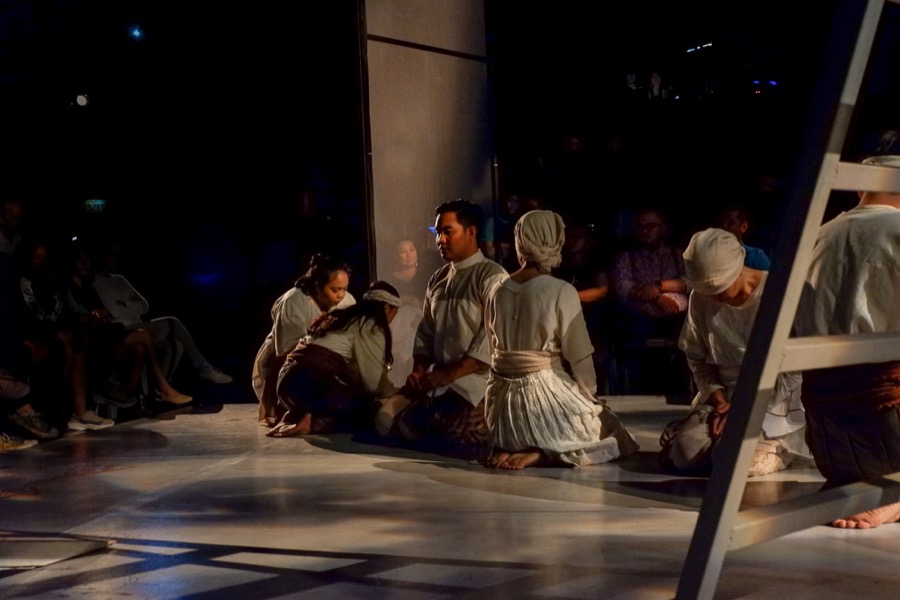
The “lack” of clear roles that each actor plays
P: Another thing to note was how no one really had specific roles? I mean the cast weren’t billed as specific characters in the story (except I suppose Doray Dayao who “played” Fatima). The actors would change “characters” by way of costume modifications, props, and mannerisms, which I thought was both impressive and confusing. Impressive because it really highlights their acting skills, but it also runs the risk of being confusing especially if the viewer is a first-timer in theater. Considering this is an entire company to keep track of, it might be challenging.
P: But it’s a commendable idea though. After the show my friends and I actually had the chance to chat with one of the Actors Company members, JV Ibesate, and he mentioned that they didn’t consider it as really “acting” as specific characters; rather, they were becoming “vessels” for different stories of different people, which made the play more challenging.
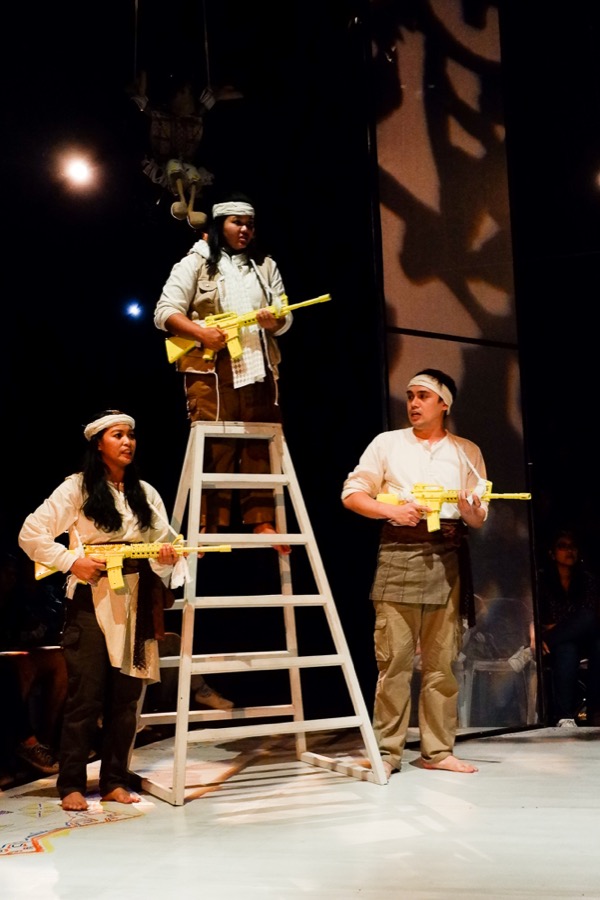
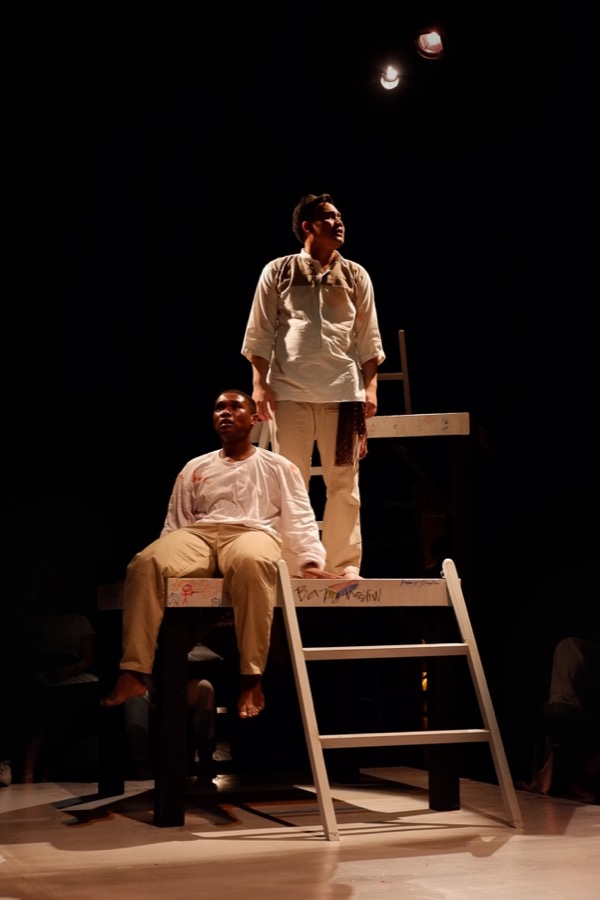
P: But if we’re talking skill, the standouts for me among the company would definitely be Ibesate (when he played Kumander, who killed Fatima’s father), Lhorvie Nuevo who played Janjalani, and Monique Nellas who played one of the hostaged teachers. Nuevo just had such a commanding presence, I don’t know, I often found myself watching her specifically whenever she was in a scene. Nellas, on the other hand, I thought gave a great emotionally-charged performance. Ibesate as Kumander was just… I hated him, haha. (In hindsight, saying that… yikes.)
Z: Not to keep banging on the puppets, but I think that was especially important in the (spoiler alert!) final scene when Fatima finally takes revenge on the aged “Muslim killer” who murdered her father. Dayao might’ve been the one handling Fatima, but in that moment, it was the entire cast playing her, all of them channelling their rage against a man and the people like him that took so many lives.
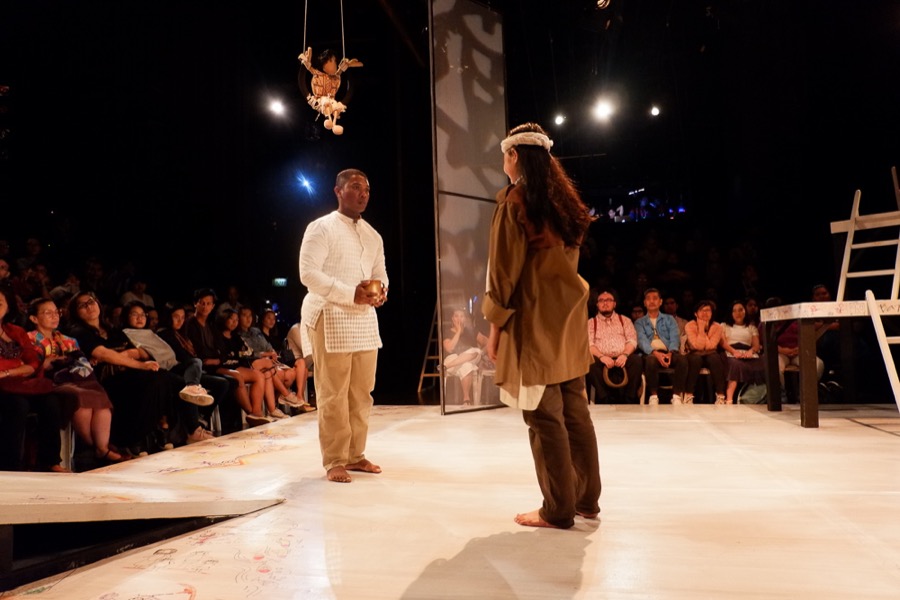
On representation
P: It’s great that Tanghalang Pilipino finally came out with this play. It’s particularly timely, not only because of the recent events in Mindanao, but also in general, when there’s a greater… demand, I suppose we could say, for works that give due representation to the many other members of our society.
P: There are a lot of groups represented in “Batang Mujahideen,” from Christians to Muslims to lumads—Yakan people, specifically. And within those groups, there are different types shown, too.
P: It’s refreshing to see that stories being tackled now aren’t all Manila-centric (although the actors and creative team did admit that this wasn’t a story they owned, considering they are in Manila, but that it was still a necessary story to tell). I think this regional movement is something that’s being seen not just in theater but also in film and food. It’s a good thing.
Z: I’m still waiting to see the day when mainstream media finally show Muslim Filipino (and really, Mindanaoan) stories that aren’t defined by the war, but I do think it’s refreshing (there’s that word again) to see a piece of media that doesn’t lump us Mindanaoans together. It was so nice to see a character acknowledge that not all Yakan people are Muslim, and the fact that such a basic fact needed to be said out loud shows how much work is still needed to be done.
Z: It was also really important that the actors were of different faiths. I’m admittedly a bit hesitant about the recent boom of regional stories because they can often reek of cultural appropriation—and I’m not saying that the play is entirely innocent of that—but just the fact that the company took pains to cast actors of different faiths for a story like this shouldn’t be ignored.
Z: That being said, and to grossly paraphrase Autostraddle’s Heather Hogan, stage Steven Patrick Fernandez’s “Mingming,” you cowards.
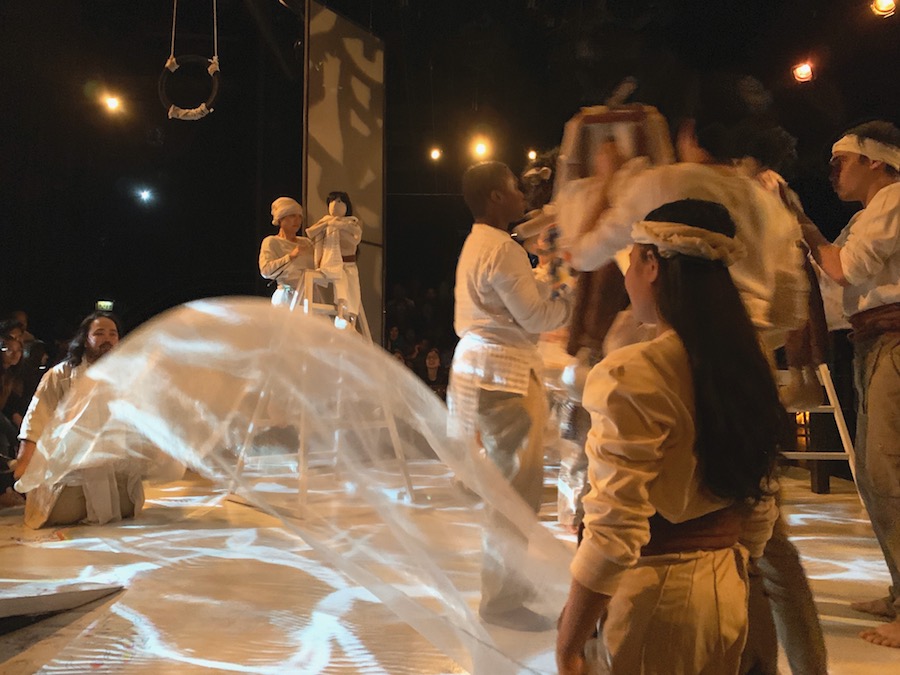
The issue of poverty
Z: It was really, really smart and necessary for the play to acknowledge that the root cause of the war is poverty. Poverty is dehumanizing, and taking away someone’s land is the same as a death sentence. Jihad, as Janjalani (I think) does not automatically mean war, and the Muslim community did not get to this decision easily. Treating the war as a personal problem doesn’t help anyone, which is why when Fatima finally takes revenge on her father’s killer, it seems powerful at first, but it’s ultimately hollow. The man might have been the one to physically murder her father, but it was the systemic violence that entrapped them. Also important? That they acknowledged that there was a Mindanao before the war, that there was a time in which Muslim Mindanao didn’t face extreme conflict. As a young person from the “Christian side” of Lake Lanao, I’ve never experienced my home town and the places near it being a ticking time bomb.
Z: I also appreciated a whole lot that the play didn’t fall into “both sides” rhetoric. Sure, both Christians and Muslims have caused fatalities, but to pretend that the circumstances for both are equal is a sin.
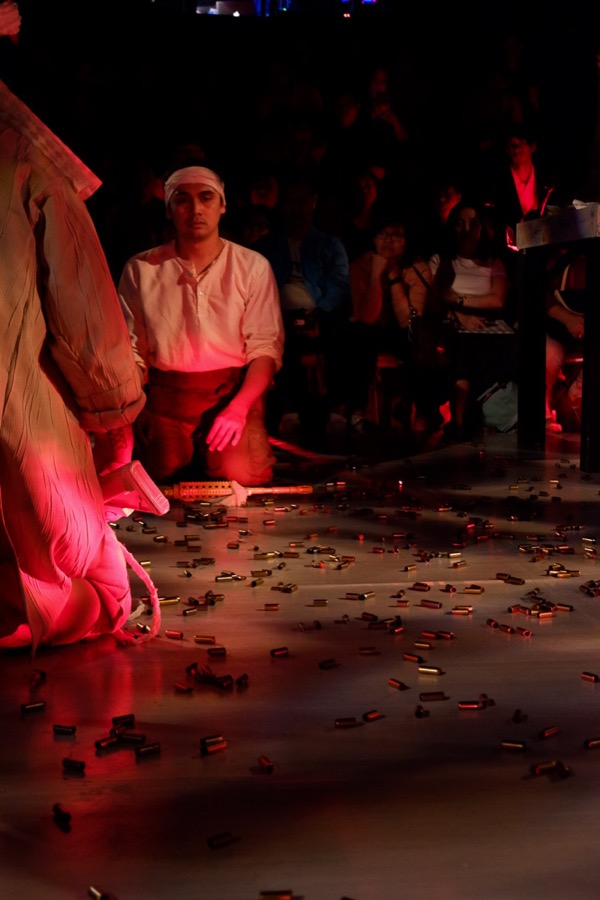
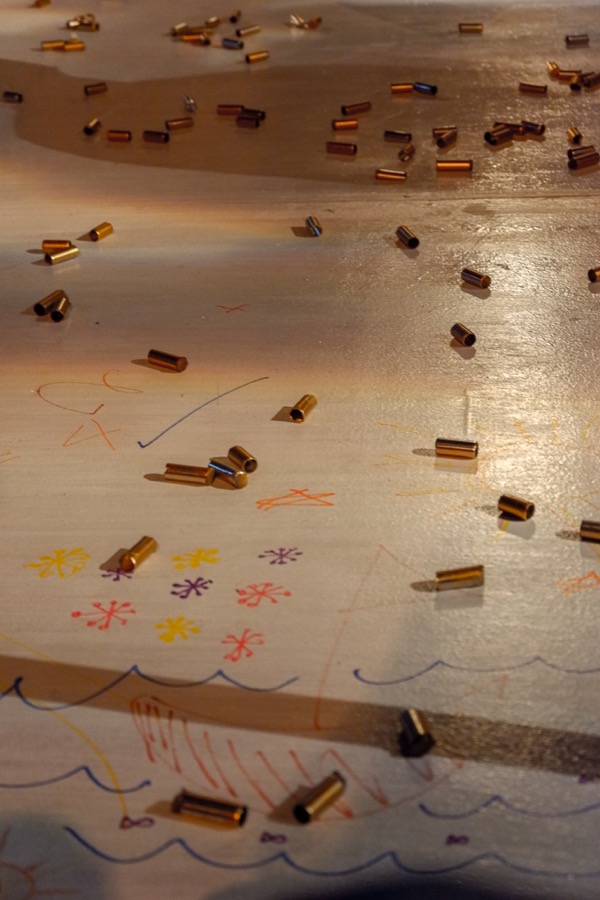
Technicality
P: I really, really liked the set design and props. It’s ironically all white—the color of peace. Or perhaps unironically, because this is what the play ultimately wants to be—a peace play. The floor is filled with colorful “children’s drawings” (the actors themselves did this; Tanghalang Pilipino had posted a bit of the process on their social media), which really helps in driving the point that children are the ones most affected in this conflict. There was one point in the play that really struck me (spoiler alert)—when, in the middle of the crossfire between the military and the Abu Sayyaf, it quite literally rained bullets in the theater. Seeing the entire stage area flooded with red lights, the floor covered in bullet shells, and the children’s drawings just peeking in between those? It gave me chills.
Tanghalang Pilipino’s “Batang Mujahideen” by Malou Jacob runs until Sunday, Mar. 8 at the CCP Little Theater. Tickets are available via Ticketworld, KTX, Ticket2me and at the CCP Box Office.
Get more stories like this by subscribing to our weekly newsletter here.
Read more:
5 brilliant things about the one-woman play ‘Every Brilliant Thing’
It’s an artist’s world, too: ‘Dekada ’70’ musical proves art can still push social discourse
PNP’s Muslim profiling in schools reeks of Islamophobia, but what’s new?
Writer: PAULINE MIRANDA and ZOFIYA ACOSTA
PHOTOGRAPHY PAULINE MIRANDA


